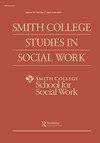墨西哥裔美国人和高加索夫妇的收入状况、婚姻满意度和育儿分工
IF 0.9
Q2 SOCIAL WORK
引用次数: 1
摘要
摘要本研究探讨有幼儿的低收入白种人和墨西哥裔美国人(MA)夫妇的婚姻满意度、儿童任务分工以及对儿童保育成果分工的满意度。参与者是521对加州夫妇,占MA的近四分之三。使用一系列回归模型来检验种族/出生状况、收入状况(双收入或单收入)和性别与每个结果变量的关系;结果显示,父亲、单亲家庭、双职工家庭的父亲和墨西哥裔家庭的母亲在他们的关系中更幸福。在白种人中,双职工家庭的父亲比单职工家庭的父亲更多地参与育儿任务,但性别、种族和出生地的差异与父母对育儿任务分配的不满有关。除了收入状况和婚姻满意度不再相关外,调整了人口统计学和社会经济地位因素的多变量回归模型对结果的影响很小。讨论的重点是分享工作和养育角色的夫妻动态,MA值,以及对临床工作和未来研究的影响。本文章由计算机程序翻译,如有差异,请以英文原文为准。
Earner Status, Marital Satisfaction, and Division of Childcare among Mexican American and Caucasian Couples
ABSTRACT This study explores marital satisfaction, division of child tasks, and satisfaction with the division of childcare outcomes among low-income Caucasian and Mexican American (MA) couples with young children. Participants were 521 California couples, nearly three-fourths MA. Using a series of regression models to examine how ethnicity/nativity status, earner status (dual or single) and gender were related to each outcome variable; results showed that fathers generally, single-earner couples generally, dual-earner MA fathers, and MA mothers in couples with Mexican nativity were happier in their relationships. Fathers in dual-earner relationships were more involved in childcare tasks than their single-earner counterparts among Caucasians, but gender, ethnicity, and nativity differences were related to parental dissatisfactions with how childcare tasks were divided. Multivariate regression models adjusted for demographic and socioeconomic status factors changed results very little, except earner status and marital satisfaction were no longer associated. Discussion focuses on couple dynamics of sharing work and parenting roles, MA values, and implications for clinical work and future research.
求助全文
通过发布文献求助,成功后即可免费获取论文全文。
去求助
来源期刊

SMITH COLLEGE STUDIES IN SOCIAL WORK
SOCIAL WORK-
CiteScore
1.50
自引率
10.00%
发文量
10
期刊介绍:
Smith College Studies in Social Work focuses on the vital issues facing practitioners today, featuring only those articles that advance theoretical understanding of psychological and social functioning, present clinically relevant research findings, and promote excellence in clinical practice. This refereed journal addresses issues of mental health, therapeutic process, trauma and recovery, psychopathology, racial and cultural diversity, culturally responsive clinical practice, intersubjectivity, the influence of postmodern theory on clinical practice, community based practice, and clinical services for specific populations of psychologically and socially vulnerable clients.
 求助内容:
求助内容: 应助结果提醒方式:
应助结果提醒方式:


